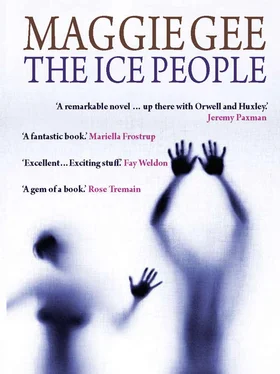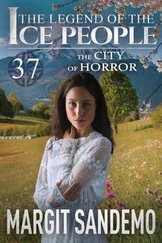Maggie Gee - The Ice People
Здесь есть возможность читать онлайн «Maggie Gee - The Ice People» весь текст электронной книги совершенно бесплатно (целиком полную версию без сокращений). В некоторых случаях можно слушать аудио, скачать через торрент в формате fb2 и присутствует краткое содержание. Год выпуска: 2008, Издательство: Telegram Books, Жанр: Фантастика и фэнтези, на английском языке. Описание произведения, (предисловие) а так же отзывы посетителей доступны на портале библиотеки ЛибКат.
- Название:The Ice People
- Автор:
- Издательство:Telegram Books
- Жанр:
- Год:2008
- ISBN:нет данных
- Рейтинг книги:4 / 5. Голосов: 1
-
Избранное:Добавить в избранное
- Отзывы:
-
Ваша оценка:
- 80
- 1
- 2
- 3
- 4
- 5
The Ice People: краткое содержание, описание и аннотация
Предлагаем к чтению аннотацию, описание, краткое содержание или предисловие (зависит от того, что написал сам автор книги «The Ice People»). Если вы не нашли необходимую информацию о книге — напишите в комментариях, мы постараемся отыскать её.
imagines an ice age enveloping the Northern Hemisphere. It is Africa’s relative warmth that offers a last hope to northerly survivors. As relationships between men and women break down, the novel charts one man’s struggle to save his alienated son and bring him to the south and to salvation.
Maggie Gee
The White Family
The Flood
The Ice People — читать онлайн бесплатно полную книгу (весь текст) целиком
Ниже представлен текст книги, разбитый по страницам. Система сохранения места последней прочитанной страницы, позволяет с удобством читать онлайн бесплатно книгу «The Ice People», без необходимости каждый раз заново искать на чём Вы остановились. Поставьте закладку, и сможете в любой момент перейти на страницу, на которой закончили чтение.
Интервал:
Закладка:
Is it that God grew tired of us? Perhaps he wanted his world again, shining, perfect, unpolluted. If humans survive, we’ll be as grass, quiet and slow like moss or grass, lowgrowing things, less arrogant. Flesh is grass, now so many have died. Already our numbers have crashed by threequarters, and that’s a conservative estimate, since no species likes to believe it’s dying …
The ice comes on, a shining wall, carrying all our follies away, untrodden light, unbroken sky.
Sometimes it’s there I see God’s face. Blank, encompassing, infinitely bright.
If there’s a God, he was happy with us that morning in Anjou when Luke started singing. The wind had dropped to an eerie stillness, as if the elements understood, and the clear cold April sunlight sparkled, and the only sound was a little stream, perhaps four hundred metres away, and Luke’s glorious voice, yearning, soaring, flying upwards and gliding down like something too quicksilver to be human, the spirit of air, the spirit of water, for some of his singing was shot through with pain, some of it our pain, I’m afraid, and also his own, for what he had lost, and what he was now about to lose — and perhaps for what he had never had, a quietly loving mother and father.
That morning we were blessed, those of us who heard him, singing all his favourites, Schumann and Gershwin, a Debussy setting of a medieval song that made me think of Sarah — Dieu, qu’il la fait bon regarder, la gracieuse bonne et belle! … Qui se pourroit d’elle lasser? Toujours sa beauté renouvelle — I never did tire of looking at her, for me her beauty was always new. And then ‘Trois Oiseaux du Paradis’ –
Luke sang in the sunlight, he sang next to Dora but he sang outwards, to the spring morning, he sang a radiant, sorrowful paean of praise to the godgiven talent that would soon leave him. Briony and I were anxious at first, lest what happened the day before should happen again, but sound poured from his throat in a silver ribbon and soon we relaxed and forgot and listened and time didn’t matter, or work, or worry, for his gift was entire, threedimensional, and it drew us in, we melted, yielded, and even the cats and the birds were silent, and the trees were still for Orpheus. Trois beaux oiseaux du Paradis, Ont passé par ici, Le premier était plus bleu que ciel … Le second était couleur de neige, Le troisième rouge vermeil … What was the gift the red bird brought? Un joli coeur tout cramoisi … It brought a beautiful crimson heart, but death, in this garden, was far away.
Until something on the grass flicked, moved, and a grey fluffy cat that was asleep on the bank sat up, acutely interested, and I heard a strange little mournful croak, Ah, je sens mon coeur qui froidit, and a frog went leaping across the lawn and the cat shot after it, pounced, missed, and the frog zigzagged away on elastic. Of course, it was spring; frogs’ mating time.
‘That was wonderful, Luke,’ I said. ‘Thank you.’ When Briony passed close by me with the washing, dry and clean and serenely folded, I saw she was crying, but she didn’t look unhappy.
Within halfanhour, we were back on the road, and from that day onwards Luke and Dora were friends.
15
Sometimes my wild boys remind me of Luke, Luke as he looked many years ago. Mostly it’s an angle of their body. When the fire’s blazed up and they’re stuffed with flesh and they suddenly get a meat sweat on them and strip off their layers and stand there naked, crowing and whooping, in the red of the fire. Their narrow bodies look curiously innocent, even when they’ve got their cocks in their hands …
The escape of the children, all over the world, was the strangest thing about the coming of the ice.
It began in England before we left, though none of us saw what was going on. We’d seen a few pictures of them on the screen, taken from a distance, for they fled the cameras. We thought it was nothing, a fiveminute wonder, we hoped they were Wanderers who happened to be young … The escaping Doves took up all our attention. And yet there were probably ten times as many children. We were too afraid to take it in.
The wild boys and girls. The breakaways. Some of them the children of Outsiders and Wanderers who didn’t know who their parents were, but many more of them Insider children whose parents couldn’t admit they were gone.
These children didn’t want to live in houses, or ‘nests’ or ‘communes’ or ‘cocoons’. They didn’t want Role Support or Wicca Wisdom or any of the crutches we deemed essential. They didn’t want to be smothered by their mothers. They didn’t want to be kept Inside. They were working life out for themselves again, running wild; living wild … Sometimes they adopted a stray oldtimer to help them do things they couldn’t do.
That was how Chef and I were adopted by Kit and Fink and Porker and Jojo, and the hundred or so kids who run with us. (Chef hasn’t cooked for the last two days. Kit says he’s sick. Fink says he’s ‘skivey’, their word for slacking, a dangerous word. I should go to see him, but I’m too busy.)
There was an unauthorised fire on the western side of the airport this afternoon, and although the Chiefboys tried to put it out they got bored around suppertime and left it to burn. So I’m making use of it, writing by the embers. Most of the others are creatures of habit; they’ve gone to sleep in the usual heap by the fire we always light for supper, nearly a mile away in front of Departures. A few of them run past, and peer over my shoulder …
I tell them to wait. They will get it all. When I’m finished, I’ll tell them the whole damn story, though what they hear won’t be like this, the truths of my heart, the truths of my life, my long strange life in the twentyfirstcentury.
They’d find it — stupid. Incomprehensible. Pointless quarrels, unnecessary problems. Simple is best, for the wild boys. Death excites them, and love and adventure. Love they can understand again, in their savage way, their animal fashion, love between male and female, that is, for they’re mating again, the wild boys. When they find the girls, they know what to do … They don’t seem to be breeding, though, in the city.
The old man in the village who’d sold me the pastries asked me if we had wild children in England, and I denied it, instantly. He warned me against a marauding band of boys who ranged around their village. ‘And the others, of course. Watch out for them.’ He nudged me, black eyes meaningful, and I wondered who ‘the others’ were.
We were twelve hours’ journey from the Pyrenees, which meant we would sleep one more night in France and try to cross the mountains by daylight, when any snowfalls would be less dangerous.
We drove till nine, then at sunset turned off towards a little colony of low white villas. There were the normal security gates, wide open, and the windows of the gatehouse were smashed. We drove through cautiously, and saw a light, too bright to be candles, in the window of a villa. ‘Maybe they’ve still got power,’ said Briony, excited at the thought of light and heat.
‘If so, they might have inhabitants,’ I said grimly. ‘And they won’t be pleased to see us, will they?’
We drove on up the little road between the cedars. Only that first house had a light showing, and perhaps that had been a security device. I desperately wanted a bed for the night, somewhere to recoup our strength for tomorrow, so we drove right down to the far end and wormed our way into a large stucco house which already had one shutter hanging off it, and underneath, a broken pane. It was a princely house, perhaps six or seven bedrooms, with an elegant drive and a waterless fountain. I was tired; I ripped my trousers climbing in, and I couldn’t help wishing that the lights would come on, and the heating, and the oven …
Читать дальшеИнтервал:
Закладка:
Похожие книги на «The Ice People»
Представляем Вашему вниманию похожие книги на «The Ice People» списком для выбора. Мы отобрали схожую по названию и смыслу литературу в надежде предоставить читателям больше вариантов отыскать новые, интересные, ещё непрочитанные произведения.
Обсуждение, отзывы о книге «The Ice People» и просто собственные мнения читателей. Оставьте ваши комментарии, напишите, что Вы думаете о произведении, его смысле или главных героях. Укажите что конкретно понравилось, а что нет, и почему Вы так считаете.












